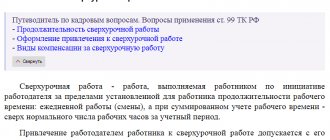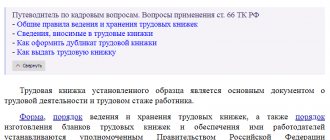What is direct actual damage
In accordance with the provisions of Article 238 of the Labor Code of the Russian Federation, all employees bear a certain financial responsibility to their managers. If, as a result of a gross violation of safety regulations or as a result of poor performance of official duties, the employer suffered some damage, expressed in material terms, then the responsible employee will be obliged to compensate the entire amount of damage.
Article 238 of the Labor Code of the Russian Federation also introduces the concept of direct actual damage. The legislator draws attention to the fact that the obligation to compensate for damages will be applied to the employee if his direct fault is established.
Direct actual damage refers to the employer’s material losses, namely a real decrease in the organization’s property mass or a significant deterioration in its condition.
As a result, the employer is forced to spend additional funds aimed at restoring damaged property, or to compensate for damage caused by the employee to third parties (if the damaged property does not belong to the organization, but is under its responsibility).
At the same time, it is separately stipulated that for the damage caused, the employee bears financial responsibility both for direct damage and for the damage that occurred to the employer as a result of reimbursement of costs to other persons acting as owners of specific property.
It is worth noting that the very definition of direct actual damage provides that the blame rests entirely with the employee. But it is noted that in some situations the employee will not be held liable. In particular, this applies to situations when an organization has introduced a new production line or is mastering new technological developments. In this situation, all damage will be transferred to the cost of the final product, and the employee’s financial liability will not be established.
Characteristics of Art. 238 TK
At the beginning it is emphasized that the employee must compensate the employer for direct actual damage caused to him. The obligation to compensate does not apply to lost profits (lost profits).
The following is the formulation of direct actual damage. This term may mean:
- real decrease in the tenant's available property;
- deterioration of the condition of the property;
- costs or additional payments that the employer is forced to make to acquire property, restore it, as well as to compensate for damage caused by an employee to third parties.
It is emphasized that the mentioned property may also belong to third parties if the tenant is responsible for its integrity.
The analyzed article is interesting not only because it directly orders the employee to compensate the employer for damages, but also because it limits the amount of such liability.
Financial liability of the employee for damage caused to the employer
The issue of financial liability of the parties to an employment agreement is expressed in the imposition on each of the parties of the obligation to pay for damages that were incurred as a result of performing official duties in an improper manner, which directly contradicts all the terms of the employment agreement concluded between the employer and the employee.
Thus, the employee’s financial liability for damage caused to the employer will be characterized by full compensation for all losses of the employer, expressed in material terms, provided that the employee’s guilt is established and is not subject to revision.
In accordance with legislative dogmas, financial liability is one of the most effective mechanisms for protecting property rights. In labor legislation, financial liability will be considered one of the types of legal liability, as a sanction for certain labor offenses.
Article 238 of the Labor Code of the Russian Federation also establishes the basic meaning of the financial liability of an employee for damage caused:
- rules for compensation of damages, defined and regulated at the legislative level, protect the employee’s wages from unlawful deductions and penalties;
- establishes conditions under which an employee has a more thrifty attitude towards the employer’s property;
- Thanks to the establishment of financial liability, partial or full repayment of the amount of damage that arose as a result of improper execution of labor agreements by the employee occurs.
Based on all of the above, we can conclude that determining the financial responsibility of an employee contributes to compliance with certain labor laws and forms normal discipline in the enterprise. In accordance with the provisions of Article 21 of the Labor Code of the Russian Federation, an employee is obliged to take care of the employer’s property, which he uses in the course of his official activities.
Otherwise, he will be obligated to pay off all damage that may occur due to the employee’s disregard for the rules established by the internal regulations. In this situation, the company will need to prove the employee’s guilt, and only after that it can make financial claims against the offender.
It is also worth paying attention to the fact that the financial liability of employees for damage caused to the employer must be specified.
Taking into account the legislative recommendations specified in Art. 232, 233, 238-250 of the Labor Code of the Russian Federation, the employment agreement must indicate all points relating to material relevance. It can be defined as complete and limited.
Limited liability implies that the employee's compensation for damages will be partial. In case of full liability. The organization will not have to incur any financial losses, since the responsibility for compensating the damage will be transferred to the responsible employee.
Article 242. Full financial liability of the employee
The employee’s full financial liability consists of his obligation to compensate the direct actual damage caused to the employer in full.
(as amended by Federal Law No. 90-FZ of June 30, 2006)
Financial liability in the full amount of damage caused may be assigned to the employee only in cases provided for by this Code or other federal laws.
Employees under the age of eighteen bear full financial liability only for intentional damage, for damage caused while under the influence of alcohol, drugs or other toxic substances, as well as for damage caused as a result of a crime or administrative violation.
(as amended by Federal Law No. 90-FZ of June 30, 2006)
Compensation for damage to third parties
As established by basic legislative provisions, an employee’s liability occurs when, as a result of his actions (or inaction), damage is caused to the organization’s property, which leads to additional expenses on the part of the employer.
The concept of financial liability is present not only in the sphere of labor relations, but also in civil law. However, a number of differences appear here, among which we can separately highlight:
- The employee’s liability lies only to the extent of direct damage, while civil law also takes into account lost benefits.
- The amount of damage to be recovered from the employee is tied to his earnings, which creates conditions for the company to establish partial liability. At the same time, this does not apply in civil law, and the perpetrator is obliged to pay the damage in full.
- The organization needs to create conditions for normal work activities. If it is determined that the damage was caused by the employee due to an unfavorable environment at the place of work, his liability will not be established.
In some cases, you may encounter a situation where damage is caused to third parties who have transferred their property to the organization for storage, or as a result of a rental agreement.
In this situation, responsibility for compensation for damage will lie with the organization, since it was the third party’s property that was transferred to it.
And only after the company has fully paid the owner of the damaged property, it can demand compensation for damage from the employee who, through his actions (or inaction), caused material damage.
The basis for the occurrence of material liability to third parties on the part of the employer is the very fact of damage. At the same time, the conditions will be the following facts:
- the damage was caused by an employee of the enterprise;
- the damage was recorded at the time the employee performed his official duties;
- the fact that the employee responsible for the damage would be liable for the damage he caused if the claim were brought against him personally.
Thus, often when problems arise with damage to the property of third parties, all responsibility rests with the employer. In turn, organizations have the right to recover their costs of paying for the damage and demand the full amount of their damage from the offending employee. In this case, the company has no choice but to go to court and resolve this issue in court if the employee does not admit his guilt.
Author of the article
Article 244. Written agreements on the full financial responsibility of employees
Written agreements on full individual or collective (team) financial liability (clause 2 of part one of Article 243 of this Code), that is, on compensation to the employer for damage caused in full for the shortage of property entrusted to employees, can be concluded with employees who have reached the age of eighteen years and directly servicing or using monetary, commodity values or other property.
(as amended by Federal Law No. 90-FZ of June 30, 2006)
Lists of works and categories of workers with whom these contracts can be concluded, as well as standard forms of these contracts, are approved in the manner established by the Government of the Russian Federation.
Exemption from punishment for material damage
Causing damage to the employer can occur in such circumstances that relieve the employee from financial liability for damage:
- force majeure (natural disasters, terrorism, military clashes);
- if the employee, in the process of performing his job duties, failed to preserve the property, despite all the efforts made, and it was impossible to do otherwise;
- situations of extreme necessity and necessary defense - material damage occurred in conditions that pose a danger to the property of the company, the life and health of employees, and third parties;
- the loss of accountable property occurred due to the fact that the employer did not provide employees with conditions for the safe storage of entrusted valuables (security, alarm, individual safes, etc.).
How to hold an employee financially liable for damage?
If it is discovered that damage has been caused, the employer is obliged to issue an order to create a commission. Its purpose is to investigate the circumstances of the incident and establish the amount of losses to the organization due to the fault of the employee. Members of the commission consider all significant facts, collect evidence of the employee’s guilt, and assess property damage.
The perpetrator in this case is required to provide a written explanation on the merits of the incident within 2 days. He also has the right to monitor the progress of the investigation and participate in it: study documents, challenge facts, and involve independent experts.
The refusal of the perpetrator to testify is recorded by a special act. The commission's conclusions are also documented (inventory acts, audits, reconciliations, etc.).
Compensation for established losses not exceeding the average monthly income of the employee is collected by order of the manager, regardless of the consent of the perpetrator. They compensate for the damage from the employee’s salary, withholding no more than 20% of it, thus stretching the payment over several months.
Voluntary compensation is issued by agreement of the parties: it can be either a lump sum payment or partial payments according to an established schedule. If the employer has no objections, the employee can compensate for losses in another way, for example, by buying new property, making repairs at his own expense, etc.
In this case, the debtor has the right to resign, but his debt will continue until full repayment. In this case, the termination of the employment contract is accompanied by the signing of an obligation to compensate for damages, which is the basis for prosecution if the former employee refuses to pay compensation.
The reluctance of the culprit to voluntarily return the costs incurred to the organization often leads the parties to court - this is the only way the employer can recover the funds due to him from his employee. The judge accepts a claim for material damage in the following situations:
- the employer did not timely collect compensation from an employee with incomplete financial liability (this must be done no later than a month from the date of the audit commission’s conclusion);
- the guilty person is not ready to compensate for damages that exceed the amount of his wages;
- the resigned employee waived his obligations to cover the losses of his former employer.
Going to court does not guarantee that the injured organization will have its claim satisfied. The judge has the right to change the amount of payment, taking into account the intent of the perpetrator, taking into account his income, the financial situation of the family, etc. The employer, in turn, can appeal this decision.
Article 248. Procedure for recovery of damages
Recovery from the guilty employee of the amount of damage caused, not exceeding the average monthly earnings, is carried out by order of the employer. The order can be made no later than one month from the date of final determination by the employer of the amount of damage caused by the employee.
If the month period has expired or the employee does not agree to voluntarily compensate for the damage caused to the employer, and the amount of damage caused to be recovered from the employee exceeds his average monthly earnings, then recovery can only be carried out by the court.
(as amended by Federal Law No. 90-FZ of June 30, 2006)
If the employer fails to comply with the established procedure for collecting damages, the employee has the right to appeal the employer’s actions in court.
An employee who is guilty of causing damage to the employer may voluntarily compensate for it in whole or in part. By agreement of the parties to the employment contract, compensation for damage by installments is allowed. In this case, the employee submits to the employer a written obligation to compensate for damages, indicating specific payment terms. In the event of dismissal of an employee who gave a written commitment to voluntarily compensate for damage, but refused to compensate for the specified damage, the outstanding debt is collected in court.
With the consent of the employer, the employee may transfer equivalent property to compensate for the damage caused or repair the damaged property.
Compensation for damages is made regardless of whether the employee is brought to disciplinary, administrative or criminal liability for actions or inactions that caused damage to the employer.








